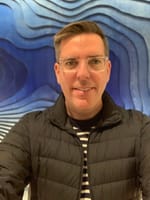My favorite YouTube video of 2023

The other day I was thinking about all the hundreds (maybe thousands?) of hours of YouTube I watched in the past year and how one unexpected video stuck with me for weeks. It was this one, about how to enjoy poetry.
In all my 51 years, I've had a fraught relationship with poetry. After watching this 11-minute video, it changed my entire point of view. If TED talks were still a big cultural thing, I'd say this should be on the main stage so more people could see and learn from it. Watch it, and maybe like me, you’ll enjoy poetry in an entirely new way.
I was good at school from an early age. I don't know why but everything came easy from the jump and that got noticed as I was shuffled into tests and eventually, gifted kid programs. I aced most classes, finished exams early, and was told to read a book to pass the time in school most days.
One dark spot was the Spring semester of 8th grade. My language arts teacher decided to focus an entire semester—half our year!—on just poetry. Every day we'd read poems and discuss them. He assigned us books and anthologies to read outside of class and we had to write papers on those too.
Back then, I barely understood similes, much less metaphor. I don't think I'm at all on the spectrum, but as a kid I was 100% literal about everything I read or heard, almost to the point of Amelia Bedelia parody. This didn't bode well for six months of talking about poems.
I sucked at this poetry class. Everyone around me followed the teacher and nodded along and people raised hands to say that short piece we just read about an eagle taking flight was really a postwar parable about freedom for an oppressed population. I was dumbfounded. I was lost. I thought I just read something about a happy eagle. I was trying as hard as I could to decipher these cryptic-as-hell poems, but I was terrible at it. The best I could do was make wild guesses of what poems might be about. No matter how hard I tried, the subject never got easier.
One day the teacher asked me to stay after class for a quick chat. He said flat out, all the kids in his classes are sharp, me included, and he typically gives out lots of A's and a few B's. The B grades are usually from kids missing assignments. But he was concerned—I hadn't missed a single assignment, yet I was barely earning a 70% C- grade.
I told him I just wasn't getting it and he agreed. Still, he kept pressing me as to why I was failing compared to everyone else. You see, he said, poetry is basically just solving a puzzle. You like puzzles, right? Matt, you need to look through the words to find the hidden meanings behind them, and instead think about what they are really trying to say as you read along. Don't ever think about what a poem says, think about what it means. A poem is never just about what it says it is about, he said. If you enjoy board games and crosswords, poetry should be no problem, so give it a solid try, can you Matt?
His advice was probably great for a college class filled with English majors, but for 14 year old me just starting to figure out the world? Not so much.
I didn't improve in the class. I grinded out the next few months of poems and papers trying to decipher "puzzles" and it was the first C I earned in an otherwise excellent permanent record. It gave me a lifelong dislike of poetry and everything around it. I honestly I don't remember enjoying a poem until well into my 30s.
The video at the top of this post breaks down why it's a bad approach to assume all poems are puzzles that need to be figured out, and why it undermines everything about poetry. I'm a huge sucker for "thought technologies", where people come up with a phrase or tip that shortcuts to the core of great advice. The video is a wonderful thought technology that changed my relationship with poetry forever.
Poems aren't riddles to be solved
I love photography. I've worked on it all my life and I enjoy gallery shows and learning new techniques and the fruits of everyone's labor who does it. I rarely think about the meaning of photos at first glance. That comparison in the video resonated hard with me.
Same thing with music, as I enjoy it at a base level. I think about how it sounds and how that makes me feel above all else. I can listen to a song dozens of times before trying to parse the lyrics. I can enjoy an album for years before I think about any messages or meanings in its songs.
This video reframed the entire concept of poetry for me in a very good, life-changing way. A poem is simply capturing a moment and a feeling. It's a glimpse into the author's experiences.
Enjoy poems in the same way you enjoy a photograph or a song, without the puzzle or riddle aspects coursing through your mind. Instead, let a poem transport you to the moment and the author's experience so you can share those feelings too. That's all.
Testing my new mindset
A couple months ago I went to see David Sedaris read from his book on stage and he's a fun guy that does unexpected things so on his most recent tour he liked to surprise audiences with an unannounced opening act.
That night's event was preceded by an unknown local poet he met in a bookstore earlier that day who'd only ever read poetry to a room of 30 people before. There were 3,000 of us in a giant auditorium as she stepped to the mic nervously.
She read six poems over the course of 15 minutes, some deep, some brief. Instead of wracking my brain trying to see through the words and phrases in order to “solve” them, I just sat and let her described experiences wash over me. Some poems were great and conveyed a great deal of emotion, while some were just so-so. But they all made me feel something. I could relate to the things she noticed and felt in her poems.
I came away from the event feeling utterly buoyant. Poems aren't puzzles meant to be solved is a thought technology I never considered, and it changed everything for me.
Lastly, I want to give a small "screw you, buddy!" to my eighth grade English teacher. He helped ruin poetry for me, for decades, by forcing me to view poems through a weird academic/gaming lens he shouldn't have foisted on kids just getting started in the subject.
I wonder how different a person I'd be today if I was simply allowed to enjoy poems on their face value as a kid, instead of as a formal structure I needed to decipher line by line from the get-go.
Subscribe to our newsletter.
Be the first to know - subscribe today




